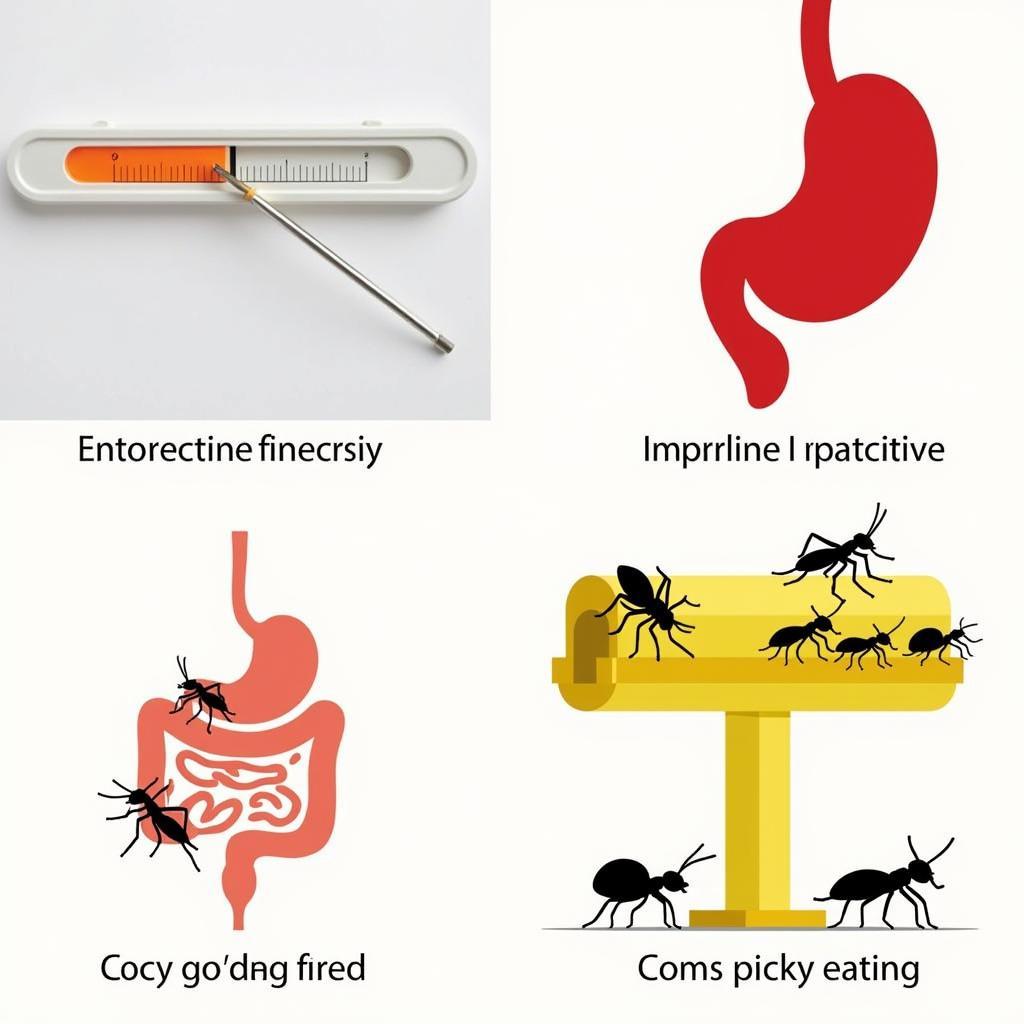Leopard geckos are fascinating creatures, known for their docile nature and relatively low maintenance. But How Long Can Leopard Geckos Live Without Food? Understanding their feeding needs is crucial for responsible pet ownership.
Leopard Gecko Fasting: How Long is Too Long?
While leopard geckos are hardy, they aren’t invincible. A healthy adult leopard gecko can typically survive for two to three weeks without food, but this isn’t ideal. Younger geckos, however, have smaller fat reserves and can only go a few days to a week without a meal. Dehydration is a more immediate concern and can be fatal within days. Always ensure fresh water is available. Going without food for extended periods can weaken your gecko’s immune system and lead to various health problems.
Factors influencing how long a leopard gecko can survive without food include age, overall health, and environmental conditions. For example, a gecko with pre-existing health issues will be more vulnerable during periods of fasting. Similarly, temperature plays a vital role. If the environment is too cold, the gecko’s metabolism slows down, and it can conserve energy and survive longer without food. Conversely, higher temperatures increase metabolic rate, requiring more frequent feeding.
Why Might a Leopard Gecko Refuse Food?
There are several reasons why your leopard gecko might be refusing food. It’s crucial to identify the cause to address the issue effectively. Common reasons include stress from a new environment, incorrect temperatures, illness, parasites, impaction, or even just picky eating!
 Reasons Why Leopard Geckos Refuse Food
Reasons Why Leopard Geckos Refuse Food
Sometimes, changes in their environment, such as introducing a new tank mate, can cause stress and lead to a temporary loss of appetite. If your gecko isn’t eating, observe its behavior for other signs of illness like lethargy, weight loss, or changes in stool. Consulting a veterinarian specializing in reptiles is always recommended if you’re concerned about your gecko’s health.
Ensuring Your Leopard Gecko’s Nutritional Needs
Providing a proper diet is essential for your leopard gecko’s health and longevity. Their diet primarily consists of live insects, such as crickets, mealworms, and dubia roaches. These should be gut-loaded with nutritious foods before being offered to your gecko. Supplementation with calcium and vitamin D3 is also critical to prevent metabolic bone disease.
While occasional fasting is normal, especially during shedding, prolonged periods without food are detrimental. Establish a regular feeding schedule and monitor your gecko’s weight and overall condition to ensure they’re thriving. You can read about how long a gecko can survive without food on this informative website. Similarly, if you’re interested in unique pet foods, check out articles about cricket cat food.
Conclusion
Understanding how long leopard geckos can live without food is vital for responsible pet ownership. While they can survive for a short period, providing regular meals and fresh water is crucial for their health and well-being. If your leopard gecko is refusing food, investigate the underlying cause and consult a veterinarian if necessary. By addressing their needs proactively, you can ensure your gecko lives a long and healthy life.
FAQ
- How often should I feed my adult leopard gecko? Adult geckos can be fed every other day or a few times a week.
- What should I do if my leopard gecko isn’t eating? Observe for other signs of illness and consult a veterinarian if necessary.
- Can leopard geckos eat fruits and vegetables? No, they are insectivores.
- How can I tell if my leopard gecko is dehydrated? The skin may appear wrinkled or tent when gently pinched.
- What is the ideal temperature for a leopard gecko enclosure? The warm side should be around 88-92°F (31-33°C).
- What are some signs of a healthy leopard gecko? A healthy gecko is alert, active, has a clear nose and eyes, and eats regularly.
- How often should I clean my leopard gecko’s tank? Spot clean daily and deep clean monthly.
Common Scenarios Regarding Leopard Geckos and Food
- Scenario 1: Your gecko hasn’t eaten in a few days. Action: Don’t panic, but monitor closely. Check enclosure temperature and ensure fresh water is available. Offer a different type of feeder insect.
- Scenario 2: Your gecko is losing weight. Action: Consult a veterinarian immediately as this could indicate a serious health problem.
- Scenario 3: Your gecko is regurgitating food. Action: This could be due to stress, incorrect temperatures, or illness. Consult a veterinarian.
More helpful content about Leopard Gecko and other reptiles:
You can learn more about how long other species such as cockroaches can survive without food by clicking on this link: can roaches survive without food.
Need Help?
For assistance, please contact us at Phone Number: 02437655121, Email: [email protected] Or visit us at: 3PGH+8R9, ĐT70A, thôn Trung, Bắc Từ Liêm, Hà Nội, Việt Nam. We have a 24/7 customer service team.